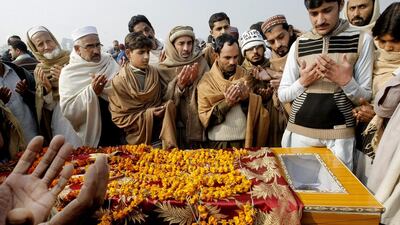CHARSADDA // Pakistan observed a day of national mourning on Thursday for the 21 people killed when heavily-armed gunmen stormed a university in the troubled north-west.
Armed police, some perched on the roofs of buildings, were still deployed at the Bacha Khan university campus in Charsadda on Thursday morning.
Security forces remained on alert, with police foiling a bomb attack at a crowded bus station in nearby Peshawar.
“We caught a man planting a bomb at Peshawar Bus Stand,” said senior police official Rokhan Zeb.
A bomb disposal team safely defused it, he said, adding that some 2,000 people were near the bus stand when the device was found.
“A big disaster has been averted due to police alertness, had the bomb exploded it could have killed and wounded scores of people.”
Wednesday’s assault in Charsadda, claimed by a faction of the Pakistani Taliban, bore a chilling resemblance to a December 2014 massacre at a school in Peshawar. That attack triggered a crackdown on militants that had been credited with a palpable improvement in security.
On Thursday, around 1,000 people in a nearby village attended the funeral of a university caretaker killed in the Charsadda attack.
“I want to tell the terrorists, they can never win, they will lose, we will win, we the followers of peace and not terrorism,” said Shah Hussain, father of the caretaker Fakhr-e-Alam.
One of the wounded students, a geology major, died overnight and his funeral was also being held on Thursday. The majority of the dead were buried on Wednesday.
Seven other survivors were in stable condition and being treated in local hospitals.
But despite Wednesday’s attack, defiant authorities kept schools in Khyber Pakhtunkhwa province open on Thursday.
“Militants want them shut down,” said provincial education minister Arif Khan. “We wanted to send the message that education will continue.”
Only Bacha Khan university and its sister university Abdul Wali Khan in the town of Mardan were closed, he said.
Flags flew at half-mast on government buildings while a prayer ceremony was set to be held in Islamabad, where Pashtun students were also organising a protest. Pashtuns form the dominant ethnic group in Khyber Pakhtunkhwa province.
More than 200 sportsmen and women gathered at a sports complex in the capital, along with officials from the Pakistan Sport Board (PSB), to offer prayers for the victims.
“We are determined that the young generation of Pakistan will not bow down to the terrorists,” PSB director Akhtar Nawaz said.
Prime minister Nawaz Sharif has vowed a “ruthless” response to the massacre and ordered security forces to hunt those behind Wednesday’s attack.
Pakistan’s Human Rights Commission called on Thursday for a “critical reappraisal” of the military operation targeting militants, warning that the army cannot succeed “without a crackdown on institutions and groups that train terrorists or help them otherwise”.
“We are not safe,” Ajun Khan, who lost his only son Asfand in the attack on the Peshawar school, said on Wednesday.
Also on Thursday, three people were killed when a rocket fired from Afghanistan hit a shop in the south-west of the country, close to the Afghan border.
The rocket struck the Angoor Adda Bazaar in the South Waziristan tribal district, one of seven semi-autonomous regions where the Pakistani military has been battling Taliban and Al Qaeda linked militants for more than a decade.
“One of the two rockets fired from Afghanistan’s Birmal town hit a bread shop, killing three Afghan nationals who were residents of South Waziristan,” said a senior military official.
The second rocket fell in a secluded place.
The official said it was still unclear who had fired the rockets.
The bazaar had been closed for six months after skirmishes between Pakistani and Afghan troops over construction by Pakistan close to the border. Officials said it reopened just a week ago.
Pakistan’s mountainous western border became a hotbed of militants following the US-led invasion of Afghanistan in 2001.
The military began a long-awaited push to clear insurgent bases from the North Waziristan tribal district in June 2014 after a bloody Taliban attack on Karachi airport sank faltering peace talks.
* Agence France-Presse

